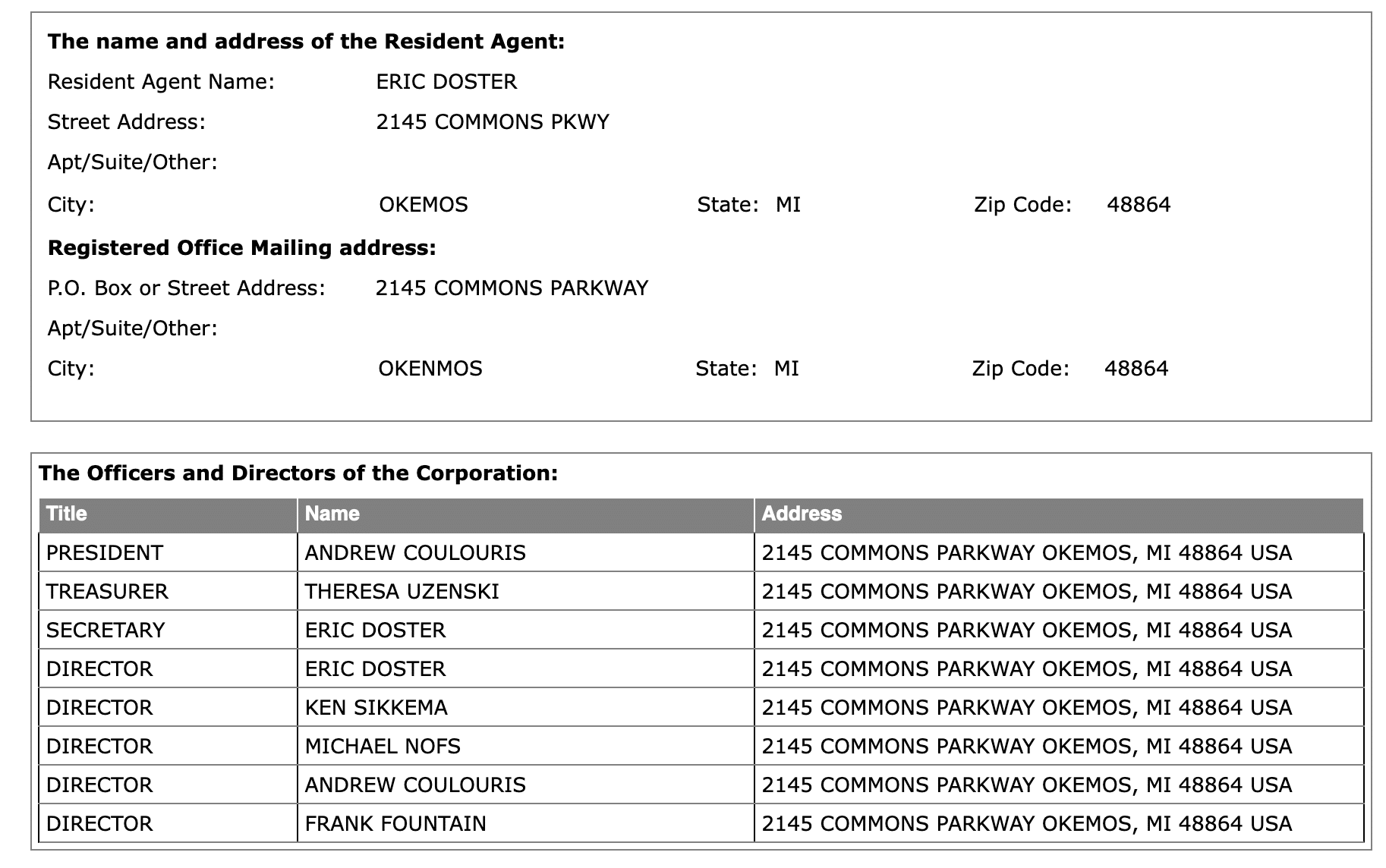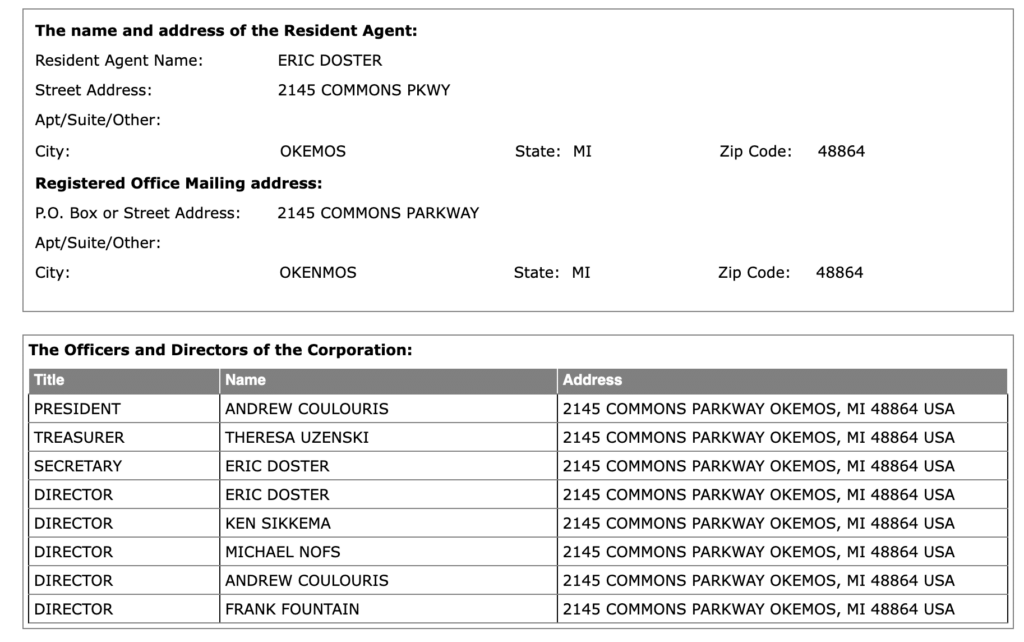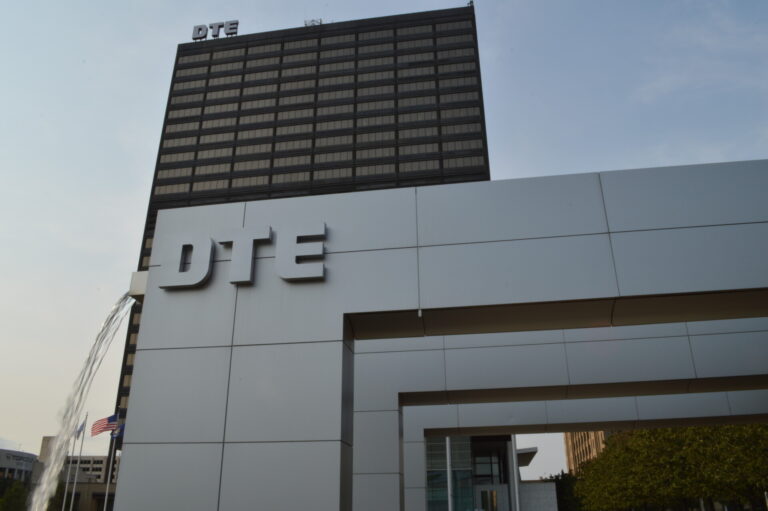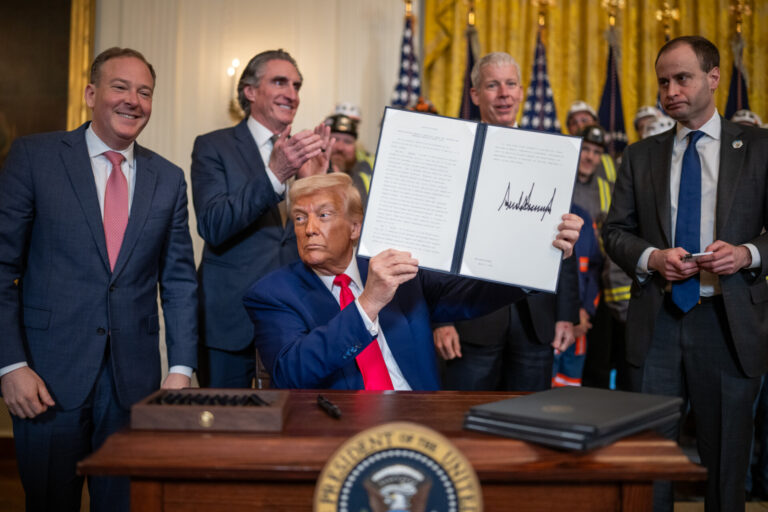Michigan Energy First

Michigan Energy First is a 501(c)(4) dark money group run by several DTE Energy executives that anchors a network of front groups affiliated with the utility. Michigan Energy First has steered millions of dollars into funds affiliated with state officials and into advertising campaigns designed to influence state elections and policy decisions.
According to its required annual tax filings, Michigan Energy First has received over $51 million in contributions since 2014. Unlike Consumers Energy and other utilities, DTE Energy does not report to shareholders its contributions to 501(c)(4) organizations.
DTE Energy is Michigan’s largest investor-owned monopoly utility, with 2.3 million electric customers and 1.3 million fossil gas customers. The utility has long been a political force, and has recently escalated its political spending as it faces growing public scrutiny over poor service, high rates, and ailing infrastructure. This strategy extends to Michigan Energy First, which in 2022 made its single-largest contribution in nine years of existence: a $1.1 million infusion to the 21st Century Fund, which is linked to the Michigan Democratic Party, as reported by the Detroit News.
The big-ticket donation came as Michigan Democrats swept 2022 state elections to win control of both legislative chambers and the governor’s office for the first time in four decades – with a campaign promise to overhaul energy laws. In addition to its record-setting gift to the Democratic party fund, Michigan Energy First also targeted the state’s most powerful Democrat: Governor Gretchen Whitmer. Per the Detroit News, it was the single-largest donation Michigan Energy First had ever made to a fund tied to a single officeholder.
Following their sweeping victory in the 2022 elections, Democratic lawmakers in 2023 ultimately passed a suite of energy bills – but not without criticism that they were too deferential to utilities and loosened bill language to appease utility interests. A DTE spokesperson did not respond when asked by the Detroit News “whether DTE believed it was appropriate for the large expenditures to benefit lawmakers who are now considering rewriting state energy laws.”
Michigan Energy First has recently favored Democratic politicians, but is not exclusively focused on that party. The dark money group reported giving $300,000 to the Republican State Leadership Committee in 2022. Michigan Energy First also made headlines when a report published by Planet Detroit and the Guardian exposed its $100,000 donation made in 2020 – amid the COVID-19 pandemic – to a separate dark money group that bankrolled the Unlock Michigan campaign to end Whitmer’s pandemic safety restrictions.
Art Reyes, executive director of We The People MI, a consumer advocacy group that campaigns for utility industry reform, said the move functionally blocked a utility shutoff moratorium, as pursued in other states during the early stages of the pandemic. “The governor’s emergency order powers were a threat,” Reyes said. “To me, it seems like DTE was inoculating against being forced to do the right thing.”
Its 2022 tax filing says the mission of Michigan Energy First is to “educate legislators and the general public on the issues facing Michigan, and to advocate.” Michigan Energy First board member Eric Doster – an attorney who has dozens of listed affiliations with political and 501(c)(4) groups in Michigan – told the Detroit News that Michigan Energy First has disbursed funds in a “deliberately non- and bipartisan manner” over “many years.”
Michigan Energy First reported $4,661,422 in “program service expenses” in its 2022 tax filing – an uptick compared to the $3,385,027 reported for 2021, which was not an election year. The 2022 total includes $2,410,000 distributed to other organizations, including 501(c)(4) nonprofits, and separately notes $1,677,422 in political contributions. The overall sum also encompasses $128,500 spent on lobbying plus $385,500 for advertising and promotion.
As a 501(c)(4), Michigan Energy First is not required to provide a detailed breakdown of all expenses. In addition to less rigorous reporting requirements, 501(c)(4) groups like Michigan Energy First can also delay public visibility into their spending. The 501(c)(4) tax filing schedule means that the public will not be able to see funds raised or spent by Michigan Energy First in 2023 until 2024. Its activities for 2024 – the current election year – will not be disclosed until 2025.
Michigan Energy First 990s: 2022, 2021, 2020, 2019, 2018, 2017, 2016, 2015, 2014.
Ties to DTE Energy
A 2023 annual report filed with the Michigan Department of Licensing and Regulatory Affairs lists Michigan Energy First’s board president as Andy Colouris, who is DTE’s vice president of corporate and government affairs. Colouris replaced former president Renze Hoeksma, a former DTE lobbyist who retired in 2022 after four decades with the utility.
The board’s treasurer is Theresa Uzenski, a manager of regulatory accounting at DTE and treasurer of DTE’s political action committee, which makes campaign contributions to candidates. Also on the board is Frank Fountain, who also served on DTE’s board. Other current Michigan Energy First board members include a pair of former Republican state lawmakers, Mike Nofs and Ken Sikkema. Rounding out the board is Eric Doster, an attorney who has affiliations with dozens of political and 501(c)(4) groups in Michigan, according to state records.

Dark money groups act as a smokescreen for DTE’s agenda
Michigan Energy First is not the only entity through which DTE marshals dark money influence.
The Michigan Department of Licensing and Regulatory Affairs database reveals a series of assumed names for Michigan Energy First: Alliance for Michigan Power, Michigan Energy Promise, MI Energy Promise, and Protect Our Values. These organizations – which have been active in state politics and policy discussions – appear to be coordinating as a single entity under the Michigan Energy First umbrella, linking them all to DTE.
DTE Energy spokesperson Peter Ternes previously told Midwest Energy News that DTE is “part of the Alliance for Michigan Power coalition,” and Hoeksema and Uzenski “serve in an advisory capacity” on the organizations’ boards “to provide information” about issues.
According to Midwest Energy News, Michigan Energy Promise supported DTE Energy’s position on net metering and other issues before the Michigan Public Service Commission. An archived page of DTE Energy’s www.journeyto80.com website pointed visitors to take action with Alliance For Michigan Power to “stay informed and involved in the energy debates that affect all of us.”
Alliance for Michigan Power has served as a platform for DTE to assert its political agenda during key policy fights in Lansing.
In one 2021 example, the group ran a social media ad campaign criticizing efforts to lift a cap on distributed generation that limited rooftop solar in Michigan. The ads included misleading claims about solar and its costs, made without evidence. The campaign, which urged viewers to sign petitions in support of DTE’s preferred policy outcome, launched just before a potential vote on the measure.
More details on Alliance for Michigan Power are available here.
DTE-affiliated groups are most active in Michigan, but these tactics have spread as far as California.
In 2022, Michigan Energy First was linked to yet another 501(c)(4) group, the Clean and Sustainable Energy Fund (CASE). The Los Angeles Times reported then that CASE had received $3 million from Michigan Energy First, then directed a portion of it to a foundation affiliated with a Department of Energy national laboratory in California. That laboratory then pushed California policymakers to support carbon capture and sequestration, a controversial and unproven technology that DTE plans to use at several biomass plants it owns in the state despite objections from environmental justice groups.
Election season activity
Other efforts by the Michigan Energy First network have focused more explicitly on election outcomes. The newest addition, Protect Our Values, surfaced just in time for the 2022 campaign season to support Republican State Rep. Joe Bellino, who was then chair of the House Energy Committee and one of the fiercest utility advocates holding office. Bellino played a key role in fending off policies DTE didn’t support, including bills aimed at lifting the cap on distributed generation – a proposal that effectively stalled when he refused to allow his committee to vote on it.
While 501(c)(4) groups like Michigan Energy First and its affiliates are prohibited from campaigning “on behalf of or in opposition to any candidate for public office” the groups are allowed to engage in some political activities, but not as their “primary activity.” The 501(c)(4) groups operating in Michigan tend to skirt around that restriction with milquetoast praise for a candidate on broad issues, such as when Protect Our Values’ ads billed Bellino “a champion for Michigan’s small business.”
Cultivating community voices
Michigan Energy Promise, which is connected to Michigan Energy First, was active in 2019 and 2020, and was advocating for a reduction in the amount customers are paid for their solar power, an issue DTE was contesting with utility regulators. Grant documents reveal that the organization exists to “educate and engage local communities and our leaders in Lansing on smart policy solutions.” It intended to perform “person-to-person engagement” through canvassing, prayer breakfasts, block parties, and community events. The group targeted low-income customers, non-English speaking customers, people in public education and safety, people with disabilities, seniors, and union members in its campaign.
Organizations listed on Michigan Energy Promise’s since-deleted “allies” webpage are mostly churches, chambers of commerce, and nonprofits that advocate for communities of color. (An archived page from February 2020 is available here.) Many of the organizations either received money from the DTE Energy Foundation, listed the utility as a corporate sponsor on their websites, or included a utility employee as a member of their board.
Michigan Energy Promise also wanted to use media initiatives, such as earned media, to reach its “targeted audience.” Former Michigan Public Service Commissioners John Quackenbush, Monica Martinez, and Steven Transeth, along with Bishop W.L. Starghill, Jr. of the Michigan Democratic Black Caucus, wrote pieces that defended DTE’s energy policy proposals. In his, Starghill Jr. mentioned that he is a member of Michigan Energy Promise.
More details on Michigan Energy Promise are available here.
Calls for transparency
In 2023, DTE executives and shareholders voted down a proposal that would have required the utility to detail corporate dark money spending, brought forward by a group of DTE shareholders who noted growing public backlash against DTE’s political influence machine. The measure would have forced greater transparency into dark money spending on lobbying and 501(c)(4) groups. It specifically called out Michigan Energy First, noting that DTE “critically fails to disclose its payments” to the group.
Michigan Attorney General Dana Nessel has also called for greater transparency into utilities’ political spending generally, including activities related to 501(c)(4)s. While Michigan utility regulators have not incorporated key recommendations she’s made that would boost visibility into dark money spending, Nessel’s office in 2023 secured a first-of-its-kind disclosure requirement for DTE as part of a settlement agreement that resolved a broader regulatory proceeding.
The provision requires that DTE, starting in October 2024, publish to its website annually a report that shows contributions that DTE entities made to recipients including 501(c)(4) groups for the prior year ending August 31.



